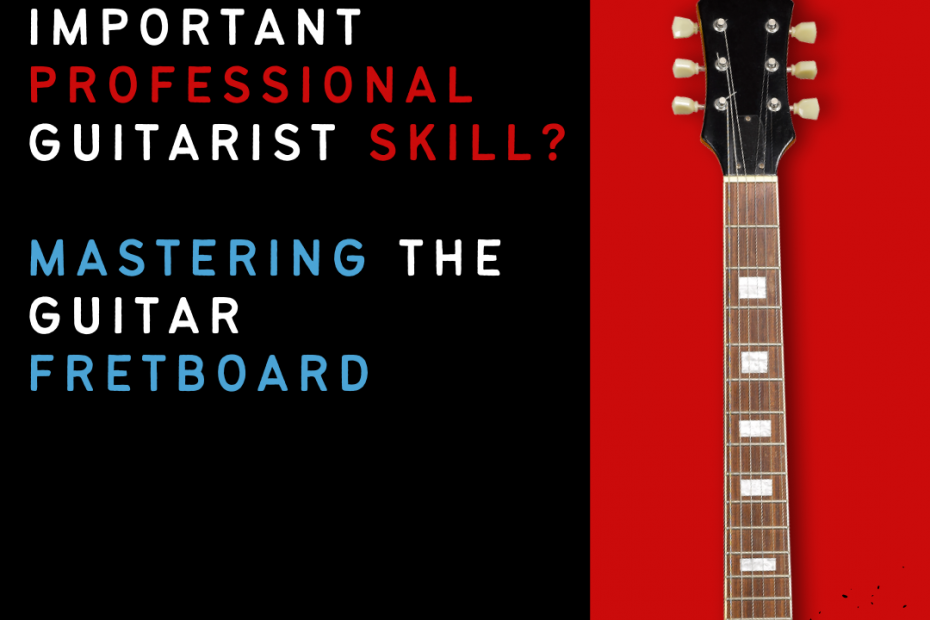This question pops up a lot with professional guitarists. In this article, I want to focus on what I think is the most important skill any professional guitarist needs and answer based on my personal experience and the accumulated experience of many others session players I consider my idols.
What’s the most important skill a professional guitarist or session guitarist needs?
In my previous blog article on the skills a session player needs, I mentioned the following points.
- Ear accuracy
- Music memorization
- Instrument proficiency
- Vast repertoire of genres
- Understanding of gear and tone
- Good communicating skills
- Entrepreneurial & self-management skills
Apart from the business and tone-related skills, all others are connected to the fretboard.
After many recording sessions, good and bad, and after following some of the session greats like Tom Bukovac and Tim Pierce, I created an opinion on what would be the one thing that separates the boys from the men in the session guitarist world.
This might sound obvious, but it all depends on what you do with the frets and strings you are given! So the answer depends on how well you know those frets.
In other words, the most important skill a professional guitarist needs is fretboard knowledge!
Related: What are the skills of a session guitarist? Guide on how to become a session guitarist.
Guitar Fretboard knowledge explained
What does it really mean to know the guitar fretboard, and how is that related to the session world and professional guitarists’ work?
The concept of fretboard knowledge has been somehow mixed up a lot during recent years from the many available online tutorials giving different answers to the same question. And actually, none of the answers is wrong; the difference lies in the goal you want to achieve.
Ultimately fretboard knowledge from the perspective of a session guitarist is the ability to play any lick, melody, or voicing instantly, everywhere on the fretboard without thinking about it.
Learning the fretboard implies learning all the following aspects of music/guitar playing
- Ear training
- Learning chord/triad shapes
- Memorizing notes and intervals
- Left-hand dexterity
- Muting efficiently
The first in the list is ear training because you should be able to recognize what you are playing to the extent that fingering chord voicing or different intervals/licks come not only from memory.
Memory is limited, while your ears are limitless.
For some people, fretboard knowledge is knowing your chords, scales, and probably your Modes. Some players, like myself, base fretboard knowledge a lot on knowing triads and the CAGED system. All the ways are right, and the method you choose does not dictate your proficiency.
Related: How to layer guitar parts?
But what’s always there is the ability to find shapes, not just memorize, and the ability to finger them while not allowing any unwanted notes. That’s where hand dexterity and muting come in hand.
Tom Bukovac, Aka Uncle Larry, Nashville’s first call for session work, has his own triad-based method, which he humbly calls “The Secret.”
Why is learning the guitar fretboard so important?
Imagine having a complex chord chart in front of you while recording a session or playing a gig with another guitar player.
If you are asked both to play rhythm, you have 2 choices, either go with the common chords or support the other guitar player by playing in a totally different area of the fretboard, the same notes.
If you are asked to play lead over that very tricky progression, the only thing that will save you is a combination of your ears and how well you know the triads of the chords in all positions of the neck.
Related: Playing guitar in the studio, why is it hard?
If you want to create a special-sounding guitar part or even write a good guitar song, using all the “unusual” shapes is one of the best ways to do it. Just thinking of the many songs you learned and thought, “wow, is that thing I’m fingering here really an A minor, and how the hell did they think about it.”
The goal of all musicians is to be Free–and Knowing the fretboard is what gives you that Freedom!
A way to help you learn the Guitar Fretboard
The internet has helped guitar players advance to new levels of proficiency in recent years. Even though there are aspects of which might have also harmed guitarists in forming “their style” and put them to nonsensical comparisons to guitarists online.
One very helpful solution to master the guitar fretboard in the Fretboard Geek Web App
With its 14 drills, it includes exercises for both ear training and mastering the fretboard of not only the 6 string guitar but also 4, 5, 6 string bass & 7 and 8 string guitar. Some session guitarists may also appreciate the mandolin drills since it’s usually session guitarists playing mandolin in sessions.
Sign up for a free trial of all the Drills and see for yourself if it’s a solution that works for you. Also, you can check out Fretboard Geek’s cheat sheets for chords and scales to have a handy companion with you on rehearsal and sessions.
